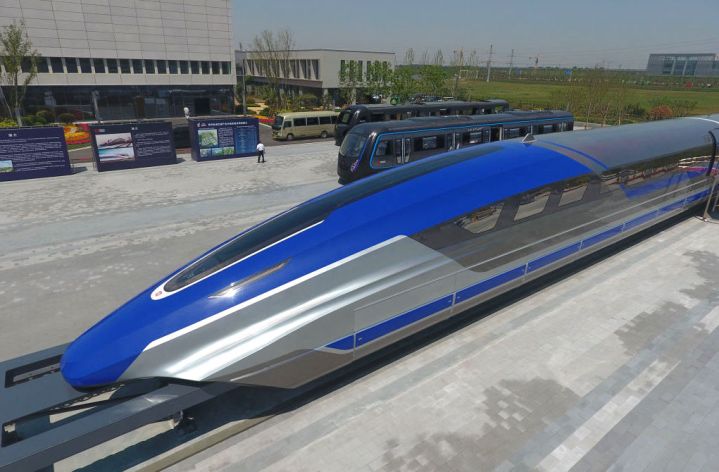
China has unveiled a prototype maglev train capable of speeds of up to 372 mph (600 kph).
The train has been built by the state-run China Railway Rolling Stock Corporation (CRRC) and following extensive testing will go into commercial production in 2021.
Maglev — short for magnetic levitation — use permanent and electro-magnets to create a current on the rail that causes the train to move along at high speed on a small cushion of air. With virtually no friction, such a train is capable of reaching an incredibly fast speed extremely quickly — without spilling your coffee.
China’s new maglev train will drastically cut journey times on the routes where it operates as it can travel at speeds far in excess of conventional rail-based trains.
“Take Beijing to Shanghai as an example,” Ding Sansan, CRRC’s deputy chief engineer, said recently in comments reported by CNN. “Counting preparation time for the journey, it takes about 4.5 hours by plane, about 5.5 hours by high-speed rail, and [would only take] about 3.5 hours with [the new] high-speed maglev.”
China already has a maglev train service in operation. Covering a distance of about 19 miles (31 km) between Shanghai Pudong International Airport and the busy Shanghai district of Pudong, the train hits a top speed of 267 mph (430 kmh) during a journey that takes just 7 minutes and 20 seconds.
Japan’s maglev preparations
Just across the water in Japan, preparations for another high-speed maglev train service have been underway for some time, with tests already taking place.
During trial runs in 2015, Central Japan Railway’s maglev train reached speeds of 375 mph (603 kmh) — about the same speed that CRRC is targeting with its new train.
Japan’s new LO Series maglev vehicle could be hurtling across the country by 2027 with the completion of the Chūō Shinkansen along a 178-mile route between Tokyo and Osaka. The high-speed service will slash the journey time between Tokyo and Nagoya to 40 minutes, and between Tokyo to Osaka to 67 minutes, more than halving the travel time offered by the already zippy bullet trains.
Speaking of bullet trains, Japan is continuing to develop its high-speed Shinkansen train for existing track, recently beginning test runs of the next-generation train. The fastest train in Japan today travels at almost 320 kmh (198 mph), but the upcoming Alfa-X— or E956 Series to give it its official name — will carry passengers at speeds of up to 360 kmh (224 mph), while upcoming test runs are expected to push the Alfa-X to 400 kmh (248 mph).


